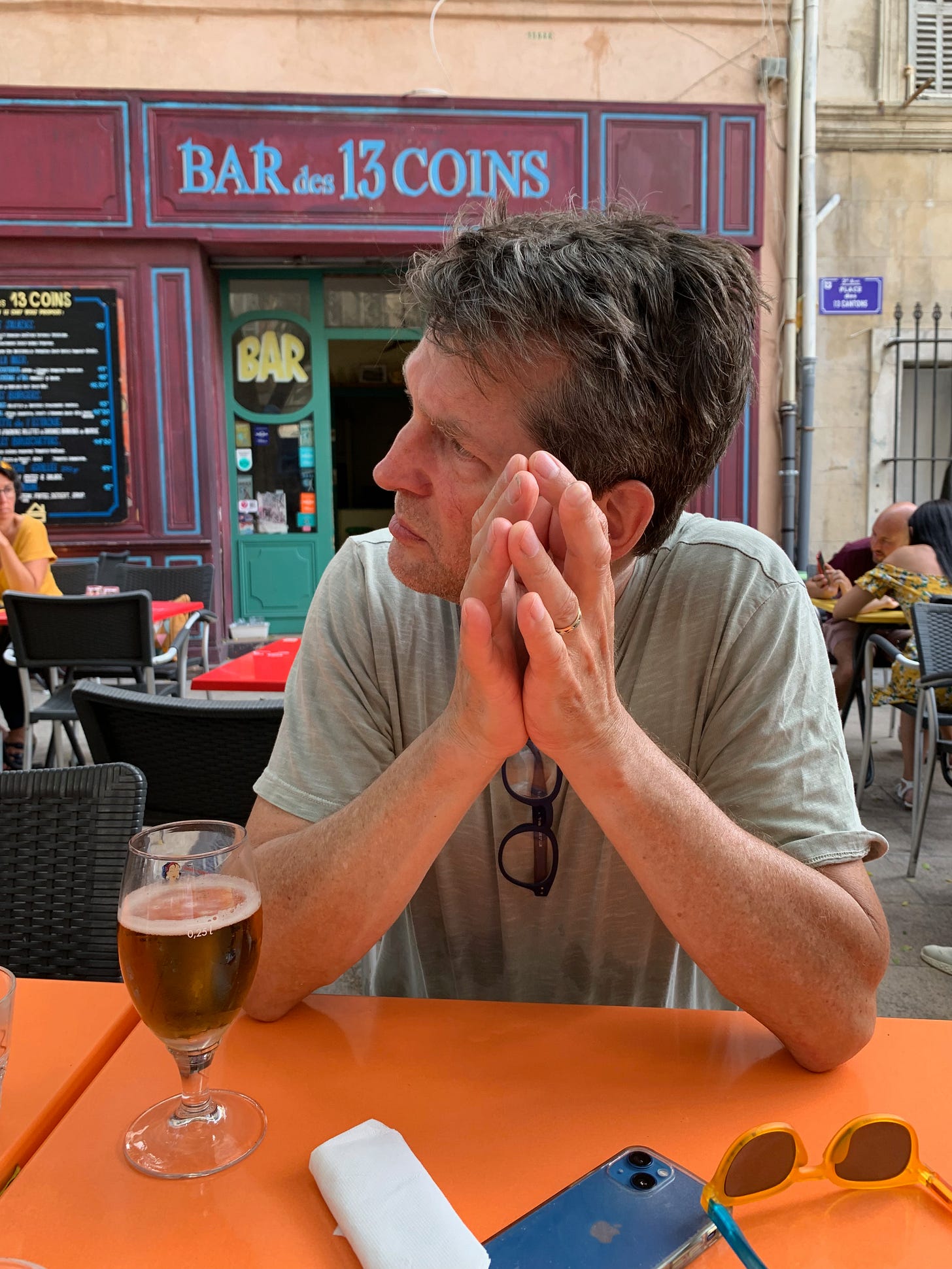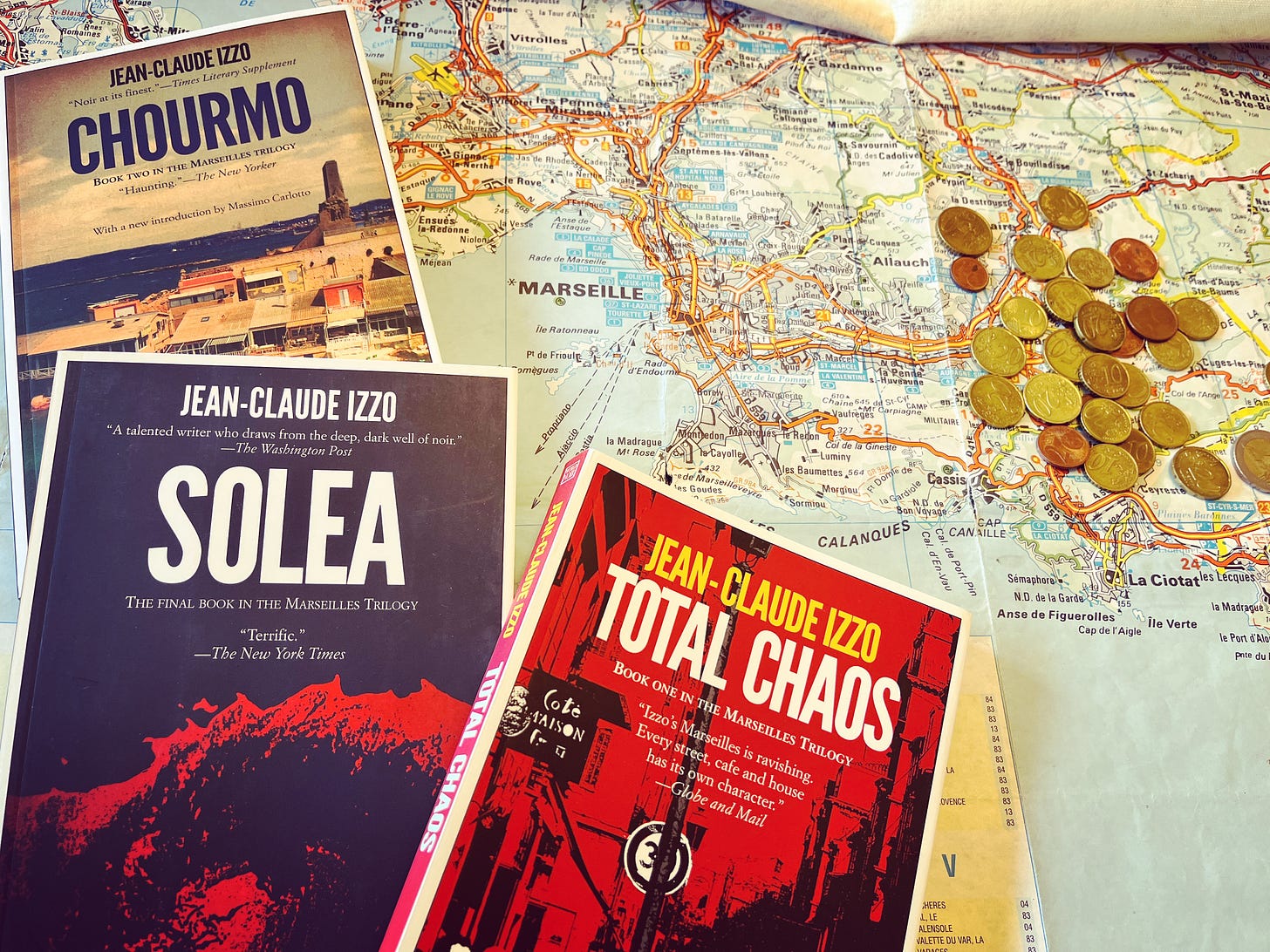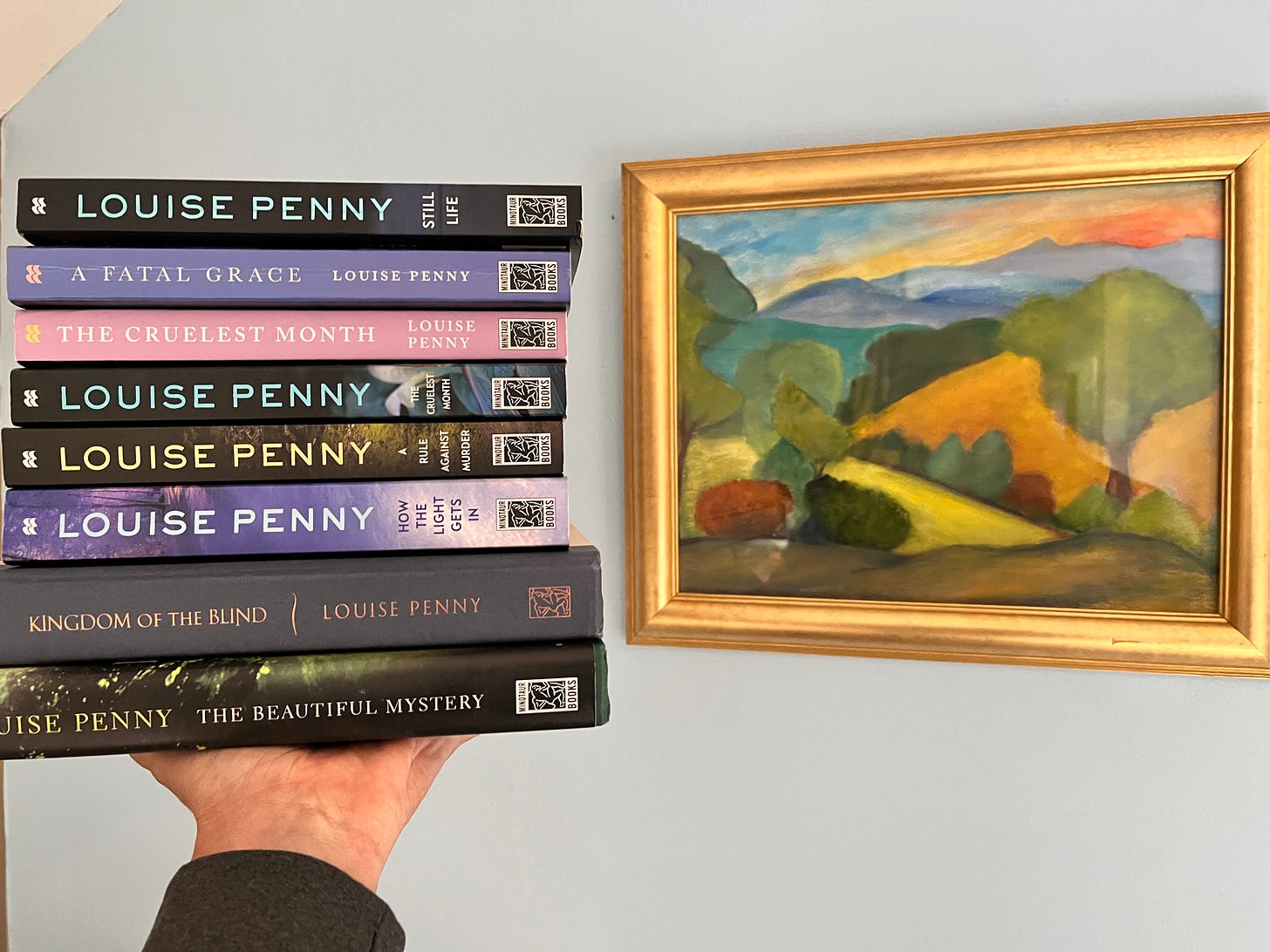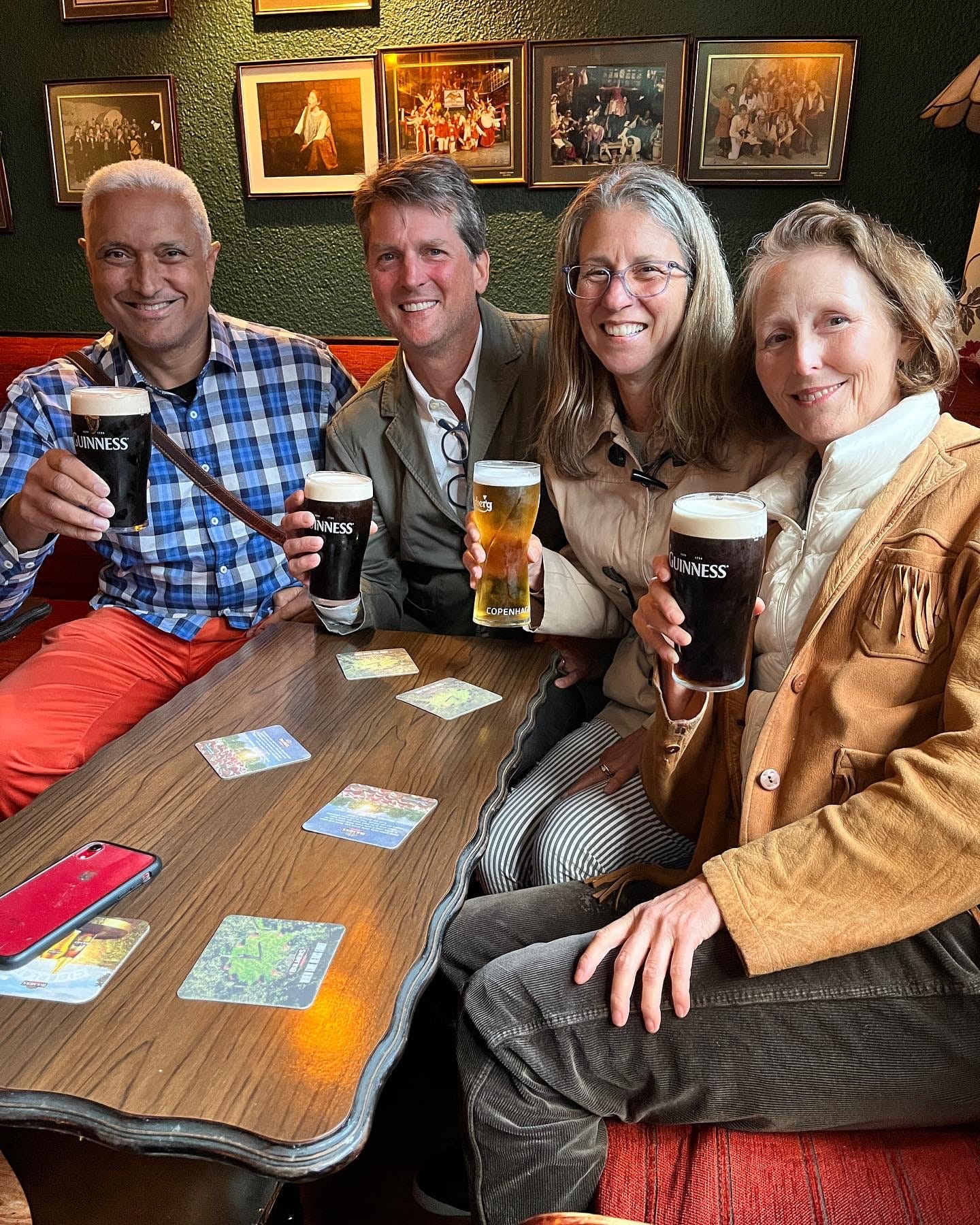Neal's 'Blood & Whiskey' - #16
International edition: Marseille, France + Dublin, Ireland + Three Pines, Quebec, Canada. Plus: two family-affair guest reviews (wife + sis-in-law) and... Pastis!
Hello friends and readers…
An invitation to a literary event in Ireland inspired a side trip to Marseille which, combined with an intro to Louise Penny and her fictional Three Pines (more on that below), has given this month’s roundup an international flair.
First up is my man-crush on French “Mediterranean noir” writer Jean-Claude Izzo, who penned a trio of gritty crime novels set in Marseille before dying in 2000 at 55. The series features Fabio Montale, son of Italian immigrants, a cop turned ex cop who drinks too much (usually Pastis — see below), falls in love too easily and too often, who loves jazz (see playlist below), justice, fishing and good food. Although Izzo insists “Marseilles isn’t a city for tourists,” I felt like he was our tour guide to the bars, restaurants, swimming coves and ancient cobblestone alleys of this rough and soulful city. Here’s me acting French-aloof at one of Montale’s favorite watering holes…
Montale reminded me of Andrea Camilleri’s loose-cannon Sicilian cop, Inspector Salvo Montalbano. (Fun fact: Camilleri, who died in 2019, wrote more than two dozen books in the Montalbano series, the first when he was 69.) For much of the trilogy, Izzo’s Montale is either chasing or fleeing from mobsters. The books capture the melting-pot beauty and tensions of this multi-ethnic city, but there’s a blunt insistence that life means little, and the story grows darker, sadder by book 3. Montale is proud to be among the city’s “children of exiles,” then explains what binds them: “We had nothing to lose, because we’d lost everything.”
Reading these books while in Marseille — constantly luring my wife, via Lime bike, bus or boat, to spots featured in Montale’s exploits (mainly featuring food or drink) — was among the more thrilling reading experiences in recent years. Izzo is a passionate, righteous writer, even if his protagonist enjoys the small daily pleasure while never experiencing deep love, family or happiness.
Still Life, A Fatal Grace, The Cruelest Month — books 1-3 in the Chief Inspector Gamache series by Louise Penny
I recently received a fun invitation from two fellow book-ish writers — Elizabeth Held (who publishes book rec newsletter, What to Read If) and Aya Martin Seaver (who publishes Victorian Literature newsletter, Can You Stand Her?) — who’ve launched a short-run newsletter celebrating mystery author Louise Penny, her Inspector Gamache books and the world of Three Pines. Each week (starting next week, through the end of the year), they’ll share posts on topics ranging from the science of murder to pets to the one I’m writing: the role of poetry in Penny’s books (scheduled for late November). Sign up here:
I’d only read one of the Gamache books years ago, picking up the series mid-cycle. It was good but I didn’t feel compelled to keep going. This time, prompted by this Notes from Three Pines project, I started from the beginning and it’s been a blast. Armand Gamache, longtime investigator with the Sûreté du Quebec, is a fascinating lawman, the opposite of guys like Montale: older, calmer, quieter, a happily-married non-drunk who investigates through watching and listening. “There was an old-world charm about Gamache,” Penny writes. And the village of Three Pines is an unlikely hub of mystery and murder, a bucolic burg south of Montreal populated by a quilt of colorful locals. Victims in the first three books include an aspiring artist, shot through the heart with an arrow; an unlikeable newcomer to Three Pines, electrocuted at a curling match; a local’s sudden death at an Easter party, apparently from natural causes — or not.
Penny is a genius for witty dialogue and steady pacing. Her characters are believable and believably strange. The books feature lots of snow and ice, good food, cozy fires, and the unexpected hatreds that cause the bodies to stack up. I’ll be writing more about Penny, Gamache and Three Pines in the months to come.
Damascus Station (Norton) — David McCloskey
Guest review from sister-in-law, Katherine Reed. (Former newspaper colleagues, Katherine and hubby Dave are also credited with introducing me to my wife.)
Even if the author bio on the dust jacket didn’t disclose it, you would know a few pages in that David McCloskey knows his spycraft and, especially, the dark labyrinth of power in Syria. You would also know that you’re in good hands. This is an espionage thriller of the highest order, but with a love story at its beating heart, which makes the stakes even greater as the story unfolds.
The plot moves quickly but without blur as CIA officer Sam Joseph is tasked with recruiting a brilliant, beautiful Syrian government official, Mariam Haddad, in Paris. The goal is to find and rescue a kidnapped CIA officer, but one problem quickly leads to another, and the bodies pile up as Sam and Mariam draw the attention of a Syrian intelligence officer and his psychopathic brother, the head of the Republican Guard.
Everyone has something or someone precious to protect, but what lengths each will go to complicates the tension. McCloskey isn’t just good at seamless depictions of countersurveillance spycraft (like “cleaning”) and geopolitical intrigue; he’s also good at character development and dialogue. That’s a rare combination and the strength of this book — a page-turner with heft.
The Dublin Murders (Penguin) — by Tana French
Mini-guest review, from my book-devourer wife, Mary T —
While in Ireland, thought I'd get in an Irish mind-set and read French's first two Dublin Murders books, In the Woods and The Likeness. These books have been combined into a TV series, which I'd watched, but that didn't affect my reading experience — except having the face of actress Sarah Green in my head. Both books are absorbing and atmospheric and I enjoyed the kind of deep analytical dive into everyone's personalities and life experiences, what they were like as children or young adults, and a contemporary perspective. French spends a lot of time on the interaction, dialogue, and relationships between the primary characters — these are long books for detective novels — which attracts me more than the procedural detective parts. Level of immersion was high although I felt In the Woods was a bit more taut and well constructed than The Likeness.
Assorted Book News:
As age 60 looms in the not-so-distant future, I find myself drawn to stories about writers and artists blooming or accelerating later in life. (Like Camilleri, see above.) And like Elizabeth Strout, profiled in this NYT piece by Liz Egan: At 66, Elizabeth Strout Has Reached Maximum Productivity
Long lists for the National Book Awards have been announced, and it’s a healthily eclectic mix: https://www.nationalbook.org/ (I’ve added this debut to my list: Shutter, by Ramona Emerson, from Soho Crime.)
For any writers out there, read this NYT piece, “How to Get Published.”
Cocktails of the Month…
Sharing two this month: one from Dublin, one from Marseille…
Whiskey Sour
My mother wasn’t a big drinker — mainly Gallo wine from a big jug — but she’d now and then ask my dad to make her a whiskey sour. In my memory this was achieved with that powdered whiskey sour “mix.” Here’s the real deal:
2 oz (or more) Irish whiskey or bourbon
juice of 1 lemon (about 1 oz - more if you like it tart)
1 oz simple syrup (or sugar, or maple syrup)
1 egg white
Mix ingredients in an empty ice shaker first, and shake for 20 seconds. Then add ice and shake for another 30 seconds. Strain into a rock-filled glass. Garnish with half an orange wheel and a cherry.
Pastis
2 oz Pastis
ice
water
It’s an acquired taste, this anise-flavored aperitif. The recommended method is simple but specific: pour the Pastis into a medium-tall glass, add a cube or three of ice, top with cold water to create a creamy, cool, slightly diluted treat. In France, most bars served it with a small bucket of ice and a small pitcher of water, which allowed me to add more ice and water along the way.
Playlist of the Month…
Inspired by the musical tastes of Izzo’s Fabio Montale, featuring Miles David, Ray Charles, Dizzy Gillespie, and some blues. Best played on shuffle + repeat.
One reason for our recent trip to Ireland was an invitation to the annual Kennedy Summer School — in New Ross, County Wexford, former home of JFK’s ancestors — where I discussed JFK, RFK, and THE FIRST KENNEDYS on a couple panels. Two friends from Seattle happened to be in Ireland and joined us for the trek to New Ross, where they were rewarded with multiple pints of “the black stuff.”
Sláinte! Until next month…
-Neal
Find me on Instagram; sometimes on Facebook, Twitter, LinkedIn, Goodreads











Following Neal's reading, drinking, and traveling adventures is an adventure in itself. Keep doing what you're doing, my friend.
So fun to see you're ALSO writing for Notes from Three Pines! I'm on book #8 myself. :)
I just finished reading Rebecca, which I was blown away by. Easy 5 stars for me.